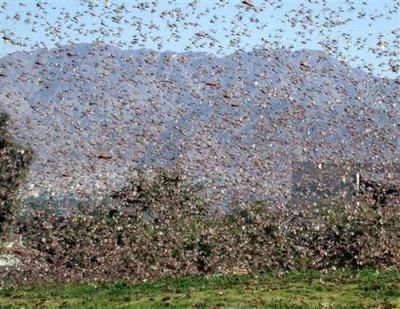By Victoria Panfilova /Vestnik Kavkaza/ – More than 2.5 million residents of Central Asia may be below the poverty line, according to experts from the World Bank (WB), whose concern is the issue of food security. In addition to the crisis caused by the COVID-19 pandemic, locusts are approaching the region. Coronavirus, collapse in world commodity prices, disruption in global and regional production chains and increased risks in financial markets, and now even locusts do not let the countries of Central Asia relax. Experts say this is the largest disaster of this magnitude in 20 years.
The locust invasion of Central Asia began two years ago from countries in East Africa and the Middle East. Iran, Pakistan and India were affected. Now, after the storms that have swept through, hot weather has established in Turkmenistan, Tajikistan and Uzbekistan – a favorable environment for the reproduction and movement of a gluttonous insect. In the east of Turkmenistan, in the Kerkinsky district of the Lebap region, 35 thousand hectares of locust gobbled up wheat crops, the deficit of which is felt in the republic this year. Moreover, last year a record grain crop was harvested.
President of Turkmenistan Gurbanguly Berdimuhamedov said he will personally monitor the progress of the grain campaign and the implementation of social programs. And so that hungry tenants do not steal grain, they were assigned police, the Chronicles of Turkmenistan portal said. Locusts also passed in Uzbekistan – in Kashkadarya, Surkhandarya, Namangan and Ferghana regions. Locusts were also found on 150 thousand hectares of land in the Zhambyl region of Kazakhstan.
“The republic’s authorities allotted $ 3.6 million to fight. Kyrgyz authorities have not yet reported locust problems, but pests have been reported in parts of Kazakhstan and Uzbekistan bordering Kyrgyzstan. In Tajikistan, locusts have destroyed all crops in the Khatlon region “Farmers complain that the state is not helping them, and the price of insecticides is too high. At least Uzbekistan said that they have already begun to take pest control measures,” Fikret, an expert on Central Asia and the Middle East, wrote on his Facebook page. Shabanov. He believes that the damage caused by pests, coupled with a reduction in food production and a decline in world trade due to the pandemic, will be a real problem for the coming winter. Food in the world will now be sorely missed.
The issue of food security is of particular concern to World Bank experts. In conditions when food supplies can be disrupted, and local producers have hardly carried out spring field work, the countries of Central Asia need to have strategic reserves, experts say. According to a published report of the WB – “Europe and Central Asia”, 2.5 million residents of Central Asian states may be below the poverty line due to the consequences of the spread of coronovirus. The post-traumatic shock for the economies of the countries of the region will not pass within a few months, and recovery will take up to 5 years. It will be difficult for young states to cope with the consequences of a pandemic on their own, therefore, most likely, experts say, external debt obligations will increase significantly.
The report also notes that due to the spread of the coronovirus, countries in the region are faced with an outflow of investment. The relative weakness of currencies contributed to an increase in the cost of borrowing, and a sharp decline in exports exacerbated the load on the balance of payments. In response to the crisis, the central banks of many countries in the region are stepping up their support for the monetary system, while the authorities intervene in the foreign exchange markets in order to stabilize the currencies of their countries and reduce volatility, for example, in Kazakhstan, or use sovereign funds, for example, in Azerbaijan and Russia.
The WB predicts a decline in the region’s economies by 4.7%, a recession will affect almost all countries. This forecast is based on the assumption of the gradual abolition of restrictive measures introduced by governments by the beginning of the second half of the year. According to a scenario involving the gradual smoothing of the effects of the pandemic and the restoration of trade and investment, it is expected that in 2021 the Central Asian economy will revive and show growth of 3.6%.






